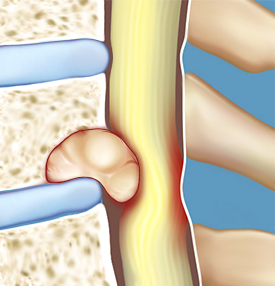What is A Spinal Tumor?

What is A Spinal Tumor?
A growth that develops within your spinal canal or the bones of your spine is called a spinal tumor. However, a spinal cord tumor begins within the spinal cord. Then, there is a vertebral tumor that affects the spinal bones.
Depending on where the tumor occurs will also determine which classification it is in. The main types of tumors that occur are as follows:
Intramedullary Tumors. These tumors begin in the cells of the spinal cord itself.
Extramedullary Tumors. This type of tumor begins in the membrane surrounding the spinal cord or nerve roots. These types of tumors do not begin in the spinal cord. However, they may affect it.
Spinal growths of any kind can cause pain, paralysis, and neurological problems. Therefore, a spine tumor can cause permanent damage and be life-threatening.
Symptoms & Signs of Spinal Tumor:
All tumors can cause different signs and symptoms. This is especially true as they grow. Tumors can affect your spinal cord or the nerve roots, blood vessels, or bones of your spine. However, some symptoms may include:
- Back pain, often radiating to other parts of your body
- Feeling less sensitive to pain, heat, and cold
- Loss of bowel or bladder function
- Pain at the site of the tumor due to tumor growth
- Trouble walking, sometimes leading to falls
- Loss of sensation, especially in your arms or legs
- Back pain that worsens at night
- Mild or severe muscle weakness
An early symptom of a spinal tumor is back pain. However, pain may also spread to other parts of your body, such as:
- Hips
- Legs
- Feet
- Arms
Even when properly treated, the pain may worsen over time. Depending on the type of tumor, it may progress at different rates.
Causes & Risk Factors:
We are not sure why a spinal tumor occurs. Some suspect that genes may play a large role in this. But it’s unknown whether they are simply developed over time or inherited. In some cases, though, exposure to specific chemicals can be the cause.
It’s more common for spinal cord tumors to occur in people who have certain conditions, such as:
- Neurofibromatosis. In this hereditary disorder, benign tumors develop on or near the nerves related to hearing. This may lead to progressive hearing loss in one or both ears. Some people with neurofibromatosis 2 also develop spinal canal tumors.
- Von Hippel-Lindau disease. This rare, multisystem disorder is associated with blood vessel tumors (hemangioblastomas) in the brain, retina, and spinal cord. And with other types of tumors in the kidneys or adrenal glands.
Diagnosing a Spine Tumor:
Spinal tumors are often overlooked. Because they are uncommon and symptoms resemble those of more common conditions.
If your physician suspects a tumor, then some tests can help diagnose the location, such as:
- MRI. This machine uses a powerful magnetic field and radio waves to produce accurate images of your spine, spinal cord, and nerves.
- CT Scan. This test uses a narrow beam of radiation for detailed spinal images.
- Biopsy. To determine the exact type of tumor it is, a biopsy must be performed.
Treatment Options:
When treating a spinal tumor, the goal is to eliminate it completely. Which must be done without damaging the spinal cord or nerves surrounding it. Treatment options include:
Monitoring
If your physician discovers the tumor before the onset of symptoms, monitoring will likely be the only treatment plan.
Surgical Options
Often patients choose surgery. This procedure would involve removing the tumor. However, there is a risk of possibly damaging the spinal cord in the process.
Not all tumors can be completely removed surgically. This is when radiation or chemotherapy is recommended.
Radiation Therapy
This may be used to eliminate the remnants of tumors that remain after surgery, to treat inoperable tumors, or to treat those tumors where surgery is too risky.
Chemotherapy
This is the standard treatment for many types of cancer. Chemotherapy uses medications to destroy cancer cells or stop them from growing. Your doctor can determine whether chemotherapy might be beneficial for you, either alone or in combination with radiation therapy.
If you are experiencing a spinal tumor without relief, call us today to visit a spine surgeon nearest you at 888-409-8006. Our offices are conveniently located in South Florida; Boca Raton, Deerfield Beach & Plantation.
